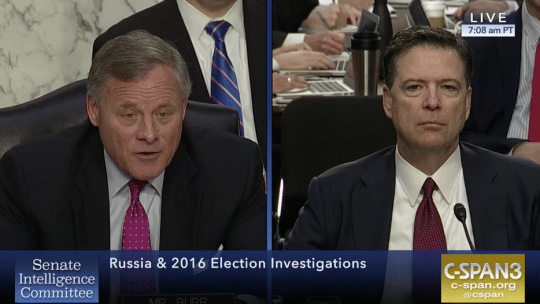
Former FBI Director James Comey's testimony to an open session of the Senate Intelligence Committee June 8 was hotly anticipated, to say the least. Eyes were glued to screens around the world as he faced questions of serious import from Committee Chair Sen. Richard Burr (R-NC), Vice Chair Sen. Mark Warner (D-VA) and the other members, a true high-stakes test of how Comey would bear up under pressure. Most would agree: The man makes a good impression.
If you work with spokespeople who are going to have some major questions thrown at them, the morning's proceedings contain several lessons. Have your media trainee watch the footage, and give them this advice:
Have an image goal.
Comey's chief aim from a personal image standpoint was to establish himself as nonpartisan and dedicated to serving the nation and the justice system. What image are you trying to project when you're in front of the camera? Some spokespeople see this kind of question as somehow dishonest, but it's not. "Just be yourself" is not bad advice per se, but you should then ask "well, who am I?" and seek to behave consistently in a manner that comports with your answers to that question.
Be unequivocal and clear.
Comey could surely sense the enormous anticipation behind his testimony and the immense irritation that would result if he had been weaselly in his answers. But that kind of irritation (if not the magnitude) exists at every level of media interaction, including those you are likely to be involved in; nobody likes a person who obviously dodges questions. That is not to say that Comey answered every question conclusively, but in those cases he always stated clearly and satisfyingly the reason he was unable to do so, often because the answer involved classified information or he simply didn't know.
Be honest about your shortcomings.
Do you have the courage to use the word "cowardly" in reference to yourself? That's what Comey did, by way of explaining why he did not more strongly rebuff President Trump's request that he drop investigations into former National Security Advisor Michael Flynn. Nobody is perfect, and nobody expects you to be, so be upfront about your flaws lest they be discovered under less advantageous circumstances. "I could be wrong" was a frequent refrain in Comey's testimony about his impression of certain matters, another humble admission that also has the benefit of making it clear that he was only offering his perspective and not trying to establish absolute facts.
Be human.
Some of the most memorable parts of Comey's testimony were charming and humanizing moments of levity. He likened the idea of giving info to media camped out on his driveway to "feeding seagulls at the beach." After he revealed that he broke a date with his wife to attend what turned out to be an extremely awkward and uncomfortable dinner with Trump, he said, "In retrospect I love spending time with my wife. I wish I had been there," prompting laughter. Even his use of the simple word "Lordy" when hoping aloud that there existed tapes of his conversations with Trump reminded the viewer that there are facets to Comey's personality beyond straitlaced FBI director and lawyer. Let your audience relate to you as a human with feelings and experiences, even if you have to let your facade of professionalism drop for a moment, and your image will reap the rewards.
Follow Ian James Wright on Twitter: @ianwright0101
